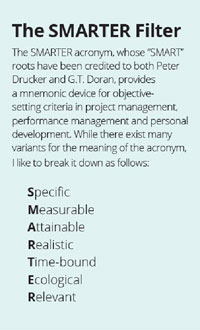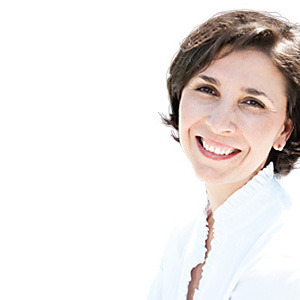Developing and maintaining an effective coaching plan with the clientpar Sophia R. Halmos
Introduction
This article was previously published in the February 2014 issue of ICF Coaching World.
Sophie Bizeul holds a master’s degree in coaching and neuro-linguistic programming from Kingston University (London). In addition to her private practice at essencialcoaching.com, she serves as a Mentor Coach on the Erickson International team and works as an elite results coach for a world-renowned peak-performance strategist. She specializes in voluntary career transitions by executives in their midlife years.

A Flight Plan for Goal Setting
Beginning a coaching session or engagement without a specific goal in sight is like putting a client on a plane with no destination: She ends up going from place to place, unsure of where she’ll land next and running the risk that she doesn’t like where she ends up. This in turn means she might not perceive much value from coaching.
In the absence of specific goals, clients tend to be like passengers on an aircraft they don’t feel responsible for—their coach’s or their story’s. By contrast, if we help our clients set goals for themselves, they’re more likely to feel like they are at the helm. As a result, they are better able to enjoy both the journey and the destination. They may not be aboard a direct flight and they might encounter unexpected disturbances along the way, but being captain of their own lives allows them to freely adjust the itinerary until they reach an arrival point that truly inspires them. So how can we support our clients in designing a flight plan that helps them reach their desired destination in a fulfilling way?
In its simplest form, a client’s in-session flight plan should answer three consecutive types of questions: what, why and how.
What? These questions should get the client to determine what she is looking to create, experience, identify and explore within a given session that will help her move forward in life. A typical question here is, “If you were to walk away with a truly powerful outcome today, what would that be?” The coach needs to listen to the client’s answers through a SMARTER filter (see sidebar on opposite page) and make sure that the goal is defined in a truly compelling way with a specific, in-session evidence procedure.
Why? This type of question addresses the relevance criterion of the SMARTER filter (see explanation in the box at right). It connects the goal to its deeper purpose and, as such, is all about getting the client’s emotional buy-in. While the “what” space is more visual in that it helps clients see in their mind’s eye what they are going for, the “why” space is more of a feeling space that associates them right here and now into what achieving a goal really means to them. Typical questions at this stage include:
• “Why is achieving that goal important to you?”
• “Who will you become in the process of achieving that goal?”
• “Who else will be impacted?”
• “What will the ripple effects be in the rest of your life?”
Some coaches also recommend using a more negative type of leverage at this stage (such as, “What will happen if you don’t achieve that goal?”), especially as a starting point to get a client motivated to take action. If you choose that route, I recommend you always come back to the vision your client is looking to create and to the compelling reasons behind it; otherwise, she may experience the journey to her goal as a battle against what she doesn’t want. This creates a negative emotional charge that actually decreases the chances of lasting success.
How? The last question, “How can you achieve your goal?,” can be about the planning and strategizing part of goal setting, but more often than not it is really about helping clients align their psychology with what it will take to get to their goal so they start feeling a sense of flow where they used to struggle.
Whatever course they choose, chances are that by answering those three consecutive types of questions, clients will increasingly feel like they are the inspired creators of a fulfilling life.

